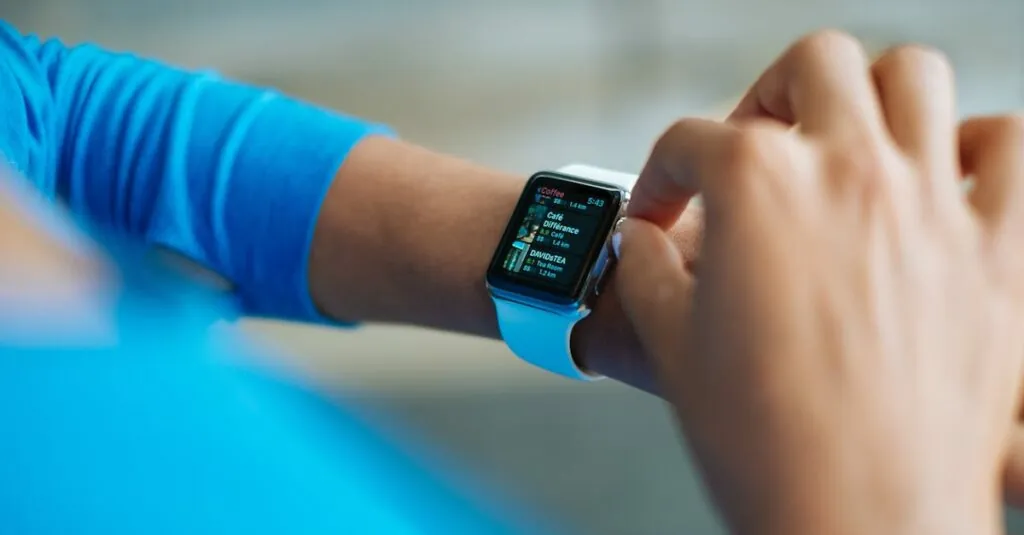Imagine a world where your wrist not only tells time but also keeps tabs on your heart rate, sleep patterns, and even your stress levels. Welcome to the future of health monitoring wearables powered by artificial intelligence. These nifty gadgets are like having a personal trainer, therapist, and doctor all rolled into one stylish accessory.
Table of Contents
ToggleOverview of AI in Health Monitoring Wearables
AI enhances health monitoring wearables by processing vast amounts of biometric data in real time. These devices track metrics like heart rate, sleep patterns, and stress levels to deliver personalized insights. Advanced algorithms analyze this data to recognize trends and patterns, helping users take proactive steps towards better health.
Wearables often feature machine learning capabilities, allowing them to adjust recommendations based on user behavior and historical data. For instance, if a person consistently experiences elevated stress, the device may suggest mindfulness exercises or breathing techniques tailored to their specific needs.
Additionally, integrations with mobile apps enable users to visualize their health trends over time, providing a comprehensive view of their well-being. These apps often use AI to create custom health plans, optimizing lifestyle changes.
Data privacy remains a critical consideration in this space. Most companies utilize encryption and anonymization techniques to protect user information. Compliance with regulations, like HIPAA in the United States, ensures that personal health data remains secure.
AI applications extend to predicting potential health problems by analyzing data patterns. If an anomaly occurs, such as irregular heart rhythms, wearables can alert users and suggest consulting a healthcare professional. This preventive capability enhances user engagement with their health and empowers them to take charge of their well-being.
Studies show that users who engage with AI-powered health wearables experience improved health outcomes. These devices encourage users to set realistic goals and persistently monitor their progress, fostering healthier lifestyles. The future of AI in health monitoring wearables promises increased functionalities and even more personalized health management solutions.
Benefits of AI Integration
AI integration in health monitoring wearables offers several key advantages. These advantages significantly enhance users’ health management experiences.
Enhanced Data Accuracy
Enhanced algorithms improve data accuracy in health wearables. These algorithms analyze biometric data more effectively, reducing errors in heart rate, sleep, and stress metrics. Users enjoy a higher confidence level in the readings they receive. Increased data precision helps tailor health recommendations to individual needs and conditions. Reliable feedback aids individuals in making informed health decisions, ultimately leading to better outcomes. Accurate monitoring also allows for timely intervention in case of detected anomalies, fostering proactive health management.
Real-Time Monitoring
Real-time monitoring stands out as a crucial benefit of AI integration. These wearables provide instant updates on various health parameters, allowing users to track their health continuously. Immediate alerts inform users of any irregularities, such as spikes in heart rate or unusual sleep patterns. With proactive notifications, individuals can adjust their activities or seek medical assistance when needed. Continuous tracking encourages individuals to adopt healthier lifestyle habits over time. Personalized insights enable users to stay engaged with their health journey, promoting a sense of accountability and motivation.
Key Technologies Driving AI in Wearables
Artificial intelligence plays a crucial role in enhancing health monitoring wearables. Two key technologies significantly contribute to this advancement.
Machine Learning Algorithms
Machine learning algorithms analyze large volumes of biometric data to offer personalized health insights. These algorithms recognize patterns and trends from user data, allowing wearables to adapt recommendations based on individual behavior. Users experience tailored suggestions for exercise, nutrition, or stress reduction. Continuous learning enables devices to refine advice with each interaction, fostering a more effective health monitoring experience. This iterative process results in improved accuracy in tracking metrics like heart rate and sleep quality.
Sensor Technologies
Sensor technologies form the backbone of health monitoring wearables. Advanced sensors measure vital signs, including heart rate and oxygen saturation. Integrations with accelerometers help track physical activity, while gyroscopes enhance motion detection accuracy. These sensors collect real-time data, facilitating instant feedback for users. Wearables incorporate biosensors to monitor physiological changes, such as hydration levels. Such features empower users to engage in informed health management, leading to better lifestyle choices and overall well-being.
Popular AI Health Monitoring Wearables
AI health monitoring wearables have gained popularity due to their ability to deliver real-time health insights and personalized recommendations. Here are some of the most notable types available on the market today.
Smartwatches
Smartwatches serve as multifunctional devices, integrating AI technology to track health metrics like heart rate, sleep quality, and stress levels. Devices such as the Apple Watch and Samsung Galaxy Watch utilize advanced algorithms to analyze user data, providing tailored alerts and insights. Notifications for irregular heart rhythms or sleep disturbances empower users to seek medical advice promptly. Many smartwatches sync with mobile health apps, allowing easy visualization of health trends and progress over time. Integration with other smart devices enhances user experience, promoting a holistic approach to health management.
Fitness Trackers
Fitness trackers focus on activity monitoring and biometric data collection while leveraging AI for deeper insights. Popular options like Fitbit and Garmin provide users with personalized fitness recommendations based on daily activity levels and performance metrics. These trackers analyze patterns in user data to suggest optimal workout intensities and recovery times. Real-time feedback keeps users motivated and encourages consistent engagement with fitness goals. Additional features such as guided breathing exercises help manage stress effectively, reinforcing the importance of mental well-being alongside physical fitness.
Challenges and Limitations
Challenges and limitations in AI health monitoring wearables present significant hurdles for users and developers. Data privacy stands as a primary concern, as sensitive health information is collected and processed. Companies face pressure to implement strong encryption methods and comply with regulations, such as HIPAA, to safeguard user data. Breaches could lead to unauthorized access and misuse of personal health information, undermining user trust.
Accuracy versus user compliance emerges as another critical issue. Devices may provide precise health metrics, but user engagement is essential for maximizing benefits. Users might not wear devices consistently or follow suggested routines, resulting in incomplete data collection. As human behavior varies, wearables must adapt to users’ lifestyles while maintaining accurate assessments. Balancing technological advances with user adherence determines the overall effectiveness of health monitoring solutions.
The integration of AI in health monitoring wearables marks a significant leap forward in personal health management. These devices not only track vital metrics but also offer tailored insights that empower users to take charge of their health. With real-time data processing and advanced algorithms, wearables can adapt to individual needs, enhancing the user experience.
As technology continues to evolve, the potential of AI in this field will only expand. Continuous improvements in data accuracy and user engagement will drive better health outcomes. However, addressing data privacy concerns and ensuring consistent user compliance will be essential for maximizing the benefits of these innovative tools. The future of health monitoring wearables looks promising, offering users unprecedented support in their wellness journeys.





